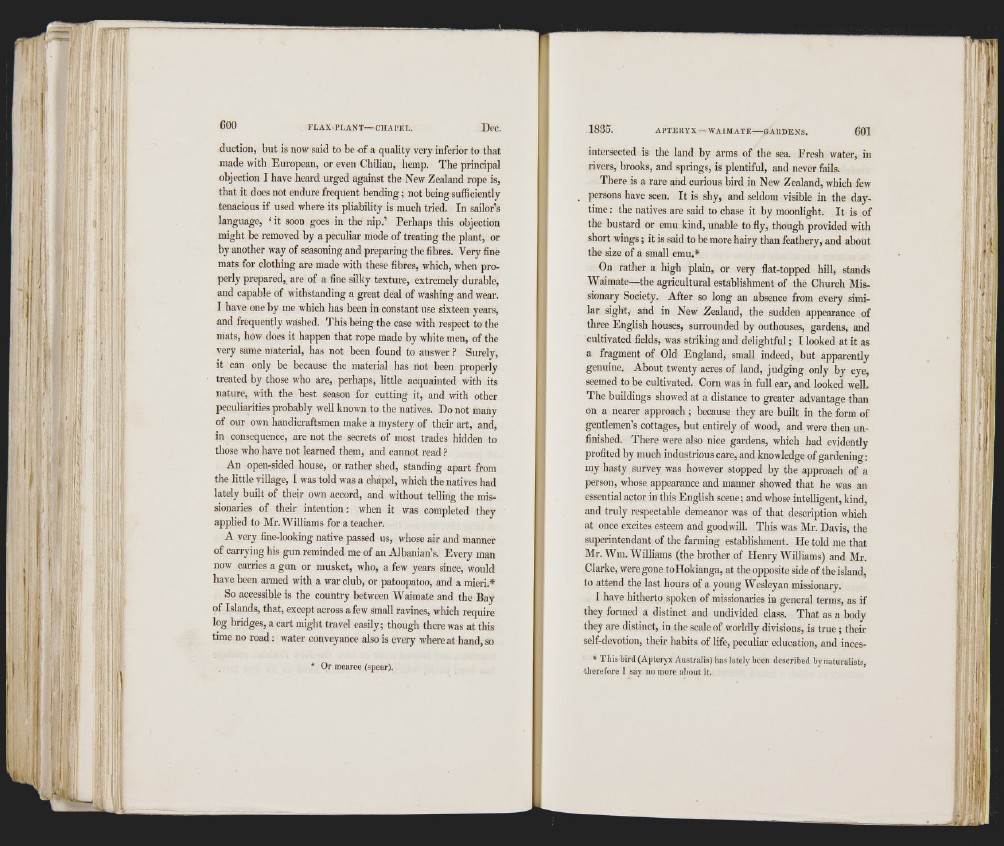
' ' 1 ,J 1 ( 4 *11
1 if
1
i 1 1 !|
! i'
i
COO FLAX-PLANT— CHAPEL. Dec.
duction, but is uow said to be of a quality vei’y iuferior to that
made with European, or even Chilian, hemp. The principal
objection I have heard urged against the New Zealand rope is,
that it does not endure frequent bending; not being sufficiently
tenacious if used where its pliability is much tried. In sailor’s
language, ‘ it soon goes in the nip.’ Perhaps this objection
might be removed by a peculiar mode of treating the plant, or
by another way of seasoning and preparing the fibres. Very fine
mats for clothing are made with these fibres, which, when properly
prepared, are of a fine silky texture, extremely durable,
and capable of withstanding a great deal of washing and wear.
I have one by me which has been in constant use sixteen years,
and frequently washed. This being the case with respect to the
mats, how does it happen that rope made by white men, of the
very same material, has not been found to answer .? Surely,
it can only he because the material has not been properly
treated by those who are, perhaps, little acquainted with its
nature, with the best season for cutting it, and with other
peculiarities probably well known to the natives. Do not many
of our own handicraftsmen make a mystery of their art, and,
in consequence, are not the secrets of most trades hidden to
those who have not learned them, and cannot read.?
An open-sided house, or rather shed, standing apart from
the little village, I was told was a chapel, which the natives had
lately built of their own accord, and without telling the missionaries
of their intention: when it was completed they
applied to Mr. Williams for a teacher.
A very fine-looking native passed us, whose air and manner
of carrying his gun reminded me of an Albanian’s. Every man
now carries a gun or musket, who, a few years since, would
have been armed with a war club, or patoopatoo, and a mieri.*
So accessible is the country between Waimate and the Bay
of Islands, that, except across a few small ravines, which require
log bridges, a cart might travel easily; though there was at this
time no road: water conveyance also is every whereat hand, so
• Or mearee (spear).
1835. Al'TERYX — WAIMATE GARDENS. 601
intersected is the land by arms of the sea. Fresh water, in
rivers, brooks, and springs, is plentiful, and never fails.
There is a rare and curious bird in New Zealand, which few
persons have seen. It is shy, and seldom visible in the daytime
: the natives are said to chase it by moonlight. It is of
the bustard or emu kind, unable to fiy, though provided with
short wings; it is said to be more hairy than feathery, and about
the size of a small emu.#
On rather a high plain, or very fiat-topped hill, stands
Waimate—the agricultural establishment of the Church Missionary
Society. After so long an absence from every similar
sight, and in New Zealand, the sudden appearance of
three English houses, sun-ounded by outhouses, gardens, and
cultivated fields, was striking and delightful; I looked at it as
a fragment of Old England, small indeed, but apparently
genuine. About twenty acres of land, judging only by eye,
seemed to be cultivated. Corn was in full ear, and looked well.
The buildings showed at a distance to greater advantage than
on a nearer approach; because they are built in the form of
gentlemen’s cottages, but entirely of wood, and were then unfinished.
There Were also nice gardens, which had evidently
profited by much industrious care, and knowledge of gardening:
my hasty survey was however stopped by the approach of a
person, whose appearance and manner showed that he was an
essential actor in this English scene; and whose intelligent, kind,
and truly respectable demeanor was of that description which
at once excites esteem and goodwill. This was Mr. Davis, the
siiperintendant of the farming establishment. He told me that
Mr. Wm. Williams (the brother of Henry Williams) and Mr.
Clarke, were gone toHokianga, at the opposite side of the island,
to attend the last hours of a young Wesleyan missionary.
I have hitherto spoken of missionaries in general terms, as if
they formed a distinct and undivided class. That as a body
they are distinct, in the scale of worldly divisions, is true ; their
self-devotion, their habits of life, peculiar education, and inces-
* This bird (Apteryx Australis) has lately been described by naturalists,
therefore I say no more about it.
Jii.
R
1 '
I '^v|f ' II 0 Cl
aV I
1 .
J l ■ .«ii